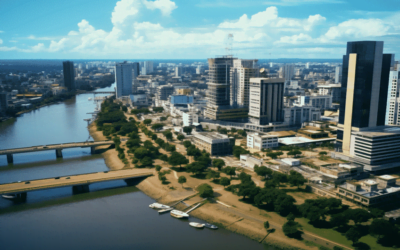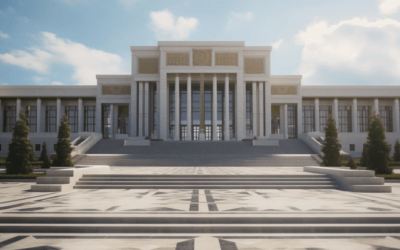Hey there! So, you’ve found your way here in search of some clarity about Syria’s drone laws, right? I get it; it’s a topic that can raise quite a few questions and concerns.
Diving into the world of drone regulations in a country like Syria can be a bit perplexing, but hey, you’re in the right place! Stick around because I’ve got some answers that should help you out.
Well, you’re in luck because I’ve done some deep digging to understand the drone laws in Syria. I’ve taken the time to sift through the information, consulted the experts, and even connected with the local authorities.
It’s all part of the journey to bring you the most accurate and up-to-date insights on this topic. You see, I wanted to make sure I had the facts straight, so you don’t have to guess or feel uncertain.
So, what’s next? If you want to know how to navigate Syria’s drone regulations and what you can or can’t do with your drone, you’re in the right place. Keep reading because I’m about to break down Syria’s drone laws for you.
Whether you’re a hobbyist, a commercial operator, a tourist, or even a government entity, I’ve got the details you need. Let’s get started on this journey through Syria’s drone laws, and by the time you’re done reading, you’ll have a much clearer picture of how to fly your drone safely and responsibly in this unique landscape.
- General Drone Laws in Syria
- Categorization of Drone Operators
- Hobbyist Drone Laws
- Commercial Drone Laws
- Drone Regulations for Visitors to Syria
- Drone Rules for Government Drone Operators
- Agencies Responsible for Regulating Drones
- Importance of ICAO Recommendations
- Final Thoughts on Syria Drone Laws
- Frequently Asked Questions on Syria Drone Laws
General Drone Laws in Syria

Hey, let’s dive into the nitty-gritty of drone regulations in Syria. It’s essential to know the ground rules before taking your drone to the skies, and I’m here to guide you through it.
Key Drone Regulations
So, here’s the deal: no matter who you are or why you’re flying a drone in Syria, certain rules apply across the board. These rules are designed to keep everyone safe and ensure that drones don’t cause any unwanted trouble. Let’s break them down one by one.
Avoid Flying Over People and Large Crowds
First off, it’s a general no-no to fly your drone over people or large gatherings. It’s all about safety, and for obvious reasons. Drones can be unpredictable, and you wouldn’t want an unexpected guest appearance by your drone at a family picnic or a bustling event, right? It’s just common sense.
Respect Privacy During Drone Flights
Respecting privacy is a biggie. While you might be focused on capturing stunning aerial shots, remember that people value their privacy. So, flying your drone close to private properties or individuals without permission can be a big breach of that privacy. Keep your distance, and you’ll be good to go.
Prohibition of Drone Flights Over Airports and Active Aircraft Areas
Now, this one’s a no-brainer. You can’t fly your drone over airports or in areas where aircraft are actively operating. It’s a matter of safety for both your drone and manned aircraft. Drones and airplanes sharing the same space don’t mix well, so give them their space, and everyone stays safe.
Daylight Hours and Good Weather Conditions for Flying
Want to catch the perfect shot? Well, daylight is your friend. Drone flights are restricted to daytime hours. Plus, you can only fly in good weather conditions. That makes sense, right? Clear skies and good visibility ensure a smooth and safe flight.
Prohibition of Drone Flights in Sensitive Areas
Here’s where it gets more serious. You should steer clear of sensitive areas, especially government or military facilities. It’s a hard-and-fast rule to ensure national security. Flying drones or camera drones around these places can lead to some real trouble.
Possible No-Fly Zones Established by Drone Manufacturers Due to Conflict
Lastly, due to the ongoing conflict in Syria, some areas may be designated as no-fly zones by drone manufacturers. They’re doing this to prevent drones from being used for unintended purposes during these turbulent times. It’s a safety measure you should definitely be aware of.
So there you have it – the general drone laws in Syria. Now you’re equipped with the basic rules that apply to all drone operators. Keep these in mind, and you’ll be off to a safe and responsible start with your drone adventures in Syria.
Also Read: Drone Regulations in Switzerland 2024
Categorization of Drone Operators

Let’s explore the world of drone operators in Syria, where different categories of flyers coexist, each with its unique set of rules and responsibilities. It’s like a tapestry, with each thread having its role to play.
Understanding the Categories
Drone operators in Syria can be broadly categorized into four groups, each with its own specific considerations. Let’s get to know these categories:
Hobbyist Drone Operators
Ah, the hobbyists! These are the folks who fly drones for the sheer joy of it. Whether it’s capturing breathtaking landscapes or simply experimenting with aerial photography, hobbyists operate drones for personal enjoyment. They often fly with less formality, exploring the skies as enthusiasts.
Commercial Drone Operators
Now, let’s shift our focus to the pros, the commercial operators. These individuals or businesses use drones for various commercial purposes. Think about aerial photography, surveying, or even delivering packages. Commercial operators need to adhere to specific regulations and permits, ensuring that their drone activities are not only productive but also safe.
Foreign Visitors/Tourists
Tourists and foreign visitors sometimes can’t resist the urge to capture the beauty of Syria from the skies. However, for them, the drone rules might be a bit different. If you’re just passing through Syria or enjoying a vacation here, there are considerations you need to be aware of when it comes to flying your drone.
Government Drone Operators
Finally, we have government drone operators. They fly drones for official purposes, which can vary from surveillance to monitoring critical infrastructure. While government entities have more leeway in some aspects, they also need to follow specific guidelines and register their drones. It’s all about maintaining transparency and accountability.
These four categories form the backbone of drone operations in Syria. Now, we’ll delve deeper into the regulations that apply to each of them, helping you navigate the drone scene with confidence and responsibility.
Also Read: Drone Regulations in Sweden 2024
Hobbyist Drone Laws

Alright, let’s talk about the hobbyists – the drone enthusiasts who enjoy the thrill of flying without a commercial agenda. If you’re one of them, you might wonder what rules apply to your drone adventures in Syria. Here’s the scoop:
Lack of Explicit Regulations
First things first, if you’re a hobbyist drone operator in Syria, you might notice a bit of a gray area. The truth is, there aren’t explicit regulations that lay it all out for you. It’s like navigating uncharted territory, which can be both exciting and a tad perplexing. But worry not, I’m here to provide some clarity.
Uncertainty About Licenses, Registration, Remote ID, and Insurance
Now, this is where things get a bit hazy. When it comes to pilot licenses, registration, remote ID, and insurance, there’s a cloud of uncertainty hanging over hobbyists. You might be wondering if you need a license, whether you should register your drone, or if insurance is a must. Unfortunately, there isn’t a crystal-clear answer to these questions at the moment.
Importance of Following ICAO Recommendations
So, how do you navigate this uncertainty? Well, here’s the key: you need to follow the International Civil Aviation Organization (ICAO) recommendations. Even in the absence of local drone regulations, ICAO offers valuable guidelines. They’re like the guiding star that keeps you on course. ICAO is a United Nations Specialized Agency that provides standards to member states, and many countries, including Syria, coordinate with ICAO to develop regulations.
So, if you’re a hobbyist drone operator in Syria, think of ICAO as your trusty compass in the vast world of drone aviation. It’s all about staying informed, flying responsibly, and enjoying the skies safely
Also Read: Drone Regulations in South Sudan 2024
Commercial Drone Laws

Alright, let’s shift our focus to the pros of the drone world – the commercial operators. These are the folks who use drones for business purposes, and they play by a different set of rules. Let’s dive into what it’s like for them in Syria:
Absence of Codified Rules
First things first, commercial drone operators in Syria might find themselves in a bit of a unique situation. You see, there’s an absence of codified rules specifically tailored to them. That can leave some room for interpretation and might even be a bit perplexing. But don’t worry; I’ve got some insights to help you navigate this.
Uncertainty Regarding Licenses, Registration, Remote ID, and Insurance
Now, here’s where the plot thickens. When it comes to pilot licenses, registration, remote ID, and insurance, commercial operators might feel like they’re navigating in foggy weather. The rules aren’t crystal clear, which can raise a few eyebrows and possibly cause some uncertainty. But that’s why we’re here – to shed some light on the situation.
Emphasizing the Need for Caution
In the midst of these uncertainties, one thing remains constant – the need for commercial operators to exercise caution. Safety is paramount, not only for the operators themselves but also for the public and the integrity of their business operations. Whether you’re capturing aerial footage for a client or delivering packages, it’s crucial to ensure that your drone operations are both productive and safe.
So, for commercial drone operators in Syria, it’s a unique landscape with its share of uncertainties. But with the right mindset and responsible flying, you can navigate this journey successfully and contribute to the growth of this exciting industry.
Also Read: Drone Regulations in South Africa 2024
Drone Regulations for Visitors to Syria

Alright, let’s talk about our fellow travelers and drone enthusiasts who might be visiting the stunning landscapes of Syria. If you’re a foreign visitor or tourist with a drone in your backpack, here’s what you need to know:
Prohibition of Foreign Visitor Drone Flights
First things first, there’s a bit of a dampener when it comes to flying drones as a foreign visitor in Syria. The rules are pretty clear on this one: it’s a no-go. Flying your drone for recreational purposes during your stay might not be on the itinerary. It’s a measure taken to ensure the safety and security of everyone in this beautiful country.
Inapplicability of Licenses, Registration, Remote ID, and Insurance for Tourists
Now, let’s talk about licenses, registration, remote ID, and insurance. As a tourist, you won’t find yourself tangled in these bureaucratic threads. They simply don’t apply to you. So, there’s no need to worry about getting a license or registering your drone. Insurance? Not necessary. Remote ID? Nope, not for tourists.
Cautions for Tourists Planning to Use Drones
But before you get too disheartened, here’s a word of caution. Even though drone flights are prohibited, it doesn’t hurt to do some research and ensure you’re fully informed about the rules and regulations during your stay. We all want your visit to be filled with breathtaking moments and no unexpected surprises, right?
So, if you’re planning to visit Syria and can’t resist capturing its beauty from the sky, remember that the rules are pretty straightforward. Leave your drone adventures for another destination, and instead, focus on exploring the wonders that this incredible country has to offer.
Drone Rules for Government Drone Operators
Now, let’s turn our attention to the government drone operators in Syria. They have a unique set of regulations that allow them to utilize drones for official purposes. Let’s break it down:
Permission for Government Drone Flights
One key aspect that separates government drone operators from the rest is that they have permission to take their drones to the skies for official tasks. Whether it’s surveillance, monitoring, or other governmental operations, these drones play a crucial role. They are essentially a tool in the government’s arsenal to maintain security and efficiency.
Exemption from Pilot License Requirements
Here’s the interesting part: government drone operators don’t need to worry about obtaining pilot licenses. Unlike hobbyists or commercial operators, government entities are exempt from this requirement. They’re trusted to operate drones for official use without the need for a formal license.
Mandated Drone Registration
However, there’s a balance between freedom and accountability. Government drone operators are mandated to register their drones. It’s all about ensuring that these drones are traceable and that their operations are transparent. This registration is essential for monitoring and oversight.
Lack of Requirements for Remote ID and Insurance
Interestingly, when it comes to remote ID and insurance, government drone operators get a bit of a pass. They aren’t bound by the same requirements as other operators. Remote ID and insurance, which are often mandatory for commercial drone operators, are not on the checklist for government drone operations.
So, for government drone operators in Syria, it’s a somewhat different landscape. They have their permissions and exemptions, making it possible to carry out important tasks using drones. These operations are essential for various government functions, ensuring the safety and security of the nation.
Also Read Drone Regulations in Sri Lanka 2024
Agencies Responsible for Regulating Drones

In the world of drone regulation in Syria, the Syrian Civil Aviation Authority (SCAA) takes center stage. Let’s delve into the details:
Introducing the Syrian Civil Aviation Authority (SCAA)
Meet the show’s star, the Syrian Civil Aviation Authority (SCAA). This governmental body is the key player when it comes to ensuring drone safety in Syria. While they might not have codified drone regulations in place, they serve as the guiding hand that oversees the skies and maintains order.
Discussing the Absence of Codified Regulations and the Role of ICAO Recommendations
Now, you might be wondering about the absence of codified drone regulations in Syria. That’s where the International Civil Aviation Organization (ICAO) recommendations come into play. Even though specific regulations are lacking, ICAO offers guidance that helps fill the gap. It’s like having a trusted companion along the way, ensuring that even in the absence of local rules, safety and responsible flying remain a top priority.
ICAO is a United Nations Specialized Agency, and it’s tasked with supporting governments in their diplomacy and cooperation related to air transport. They’re like the seasoned experts who help countries develop drone regulations. They provide standards, model regulations, and circulars that member states, including Syria, can adopt.
So, when it comes to regulating drones in Syria, it’s a combined effort with the SCAA overseeing matters and ICAO providing the necessary recommendations. Together, they aim to ensure safe and responsible drone operations in this unique and beautiful country.
Also Read: Drone Regulations in Slovenia 2024
Importance of ICAO Recommendations

In the world of drone regulations, the International Civil Aviation Organization (ICAO) plays a pivotal role, especially in regions like Syria where local regulations are yet to be codified. Let’s explore why ICAO recommendations are so significant:
ICAO’s Role as a United Nations Specialized Agency
ICAO is not just any organization; it’s a United Nations Specialized Agency. Picture it as a guardian of the skies, funded and directed by 193 national governments. Its primary purpose is to support these governments in their diplomatic and cooperative efforts in air transport. Think of it as a diplomatic backbone, ensuring that the skies are safe and well-regulated.
Providing Standards and Support for Member States
One of ICAO’s core functions is to provide standards to its member states. These standards are like the building blocks for drone regulations. They help maintain consistency and safety across borders. ICAO is the silent partner that countries can lean on when developing their drone rules. It’s like having a global support system that ensures aviation standards are met.
ICAO Model UAS Regulations and Circulars for Member States’ Adoption
In addition to standards, ICAO provides model regulations and circulars. These are like templates that member states, including Syria, can adopt. They serve as blueprints, making it easier for countries to create their own drone regulations. It’s a collaborative effort to ensure that even in the absence of local rules, the skies remain safe, and drone operators can navigate with confidence.
So, when local regulations are absent, remember that ICAO is the guiding star. They’re the experts who ensure that global standards are met, and drone operators can fly responsibly, no matter where they are in the world.
Also Read: Drone Regulations in Slovakia 2024
Final Thoughts on Syria Drone Laws

And there you have it, a comprehensive look at drone regulations in Syria. Let’s wrap this up:
To put it simply, drone regulations in Syria are a bit of a mixed bag. For hobbyists and commercial operators, there’s a sense of uncertainty regarding licenses, registration, remote ID, and insurance. But the need for caution and responsible flying remains consistent. Government operators, on the other hand, have the advantage of permissions and exemptions, ensuring they can carry out their vital tasks.
Foreign visitors and tourists, however, must be aware that drone flights are prohibited during their stay, even though licenses, registration, remote ID, and insurance don’t apply to them.
It’s important to remember that Syria is a region with a complex history of conflict. Safety is paramount, not just for the drone operators but for the public and the nation’s stability. Responsible drone operation ensures that we can enjoy the breathtaking beauty of this land without compromising anyone’s safety.
So, whether you’re a hobbyist, a commercial operator, a tourist, or a government entity, always fly with caution, adhere to the guidelines, and, most importantly, cherish the privilege of exploring the skies in this unique and remarkable country.
Frequently Asked Questions on Syria Drone Laws
1. Are drone flights allowed in Syria?
Drone flights are indeed allowed in Syria, but there are specific regulations and restrictions that must be adhered to. For example, you must avoid flying over people, respect others’ privacy, and not fly over airports or areas with active aircraft. Also, it’s crucial to fly only during daylight hours and in good weather conditions. Be aware that flying in sensitive areas, including government or military facilities, is prohibited. Due to the ongoing conflict in Syria, drone manufacturers like DJI may establish no-fly zones without prior notice to prevent drones from being used as weapons.
2. Do I need a license to fly a drone in Syria?
Syria’s drone laws present some uncertainties when it comes to licenses. For hobbyist and commercial drone operators, explicit regulations regarding licenses are not available. However, government drone operators are exempt from pilot license requirements. As a foreign visitor or tourist, you are not required to obtain a drone pilot license in Syria, as drone flights are generally prohibited for visitors.
3. Can I register my drone in Syria?
Syria’s drone regulations do not explicitly address drone registration for hobbyists and commercial operators. However, for government drone operators, registration is mandated. As a foreign visitor or tourist, drone registration is not applicable, as drone flights are typically not allowed.
4. Do I need drone insurance in Syria?
For hobbyists and commercial operators in Syria, there is uncertainty regarding the need for drone insurance. The regulations do not clearly specify insurance requirements. However, as a foreign visitor or tourist, drone insurance is generally not applicable since drone flights are restricted.
5. How can I ensure safe and responsible drone operations in Syria?
Safety is paramount, especially in a conflict-affected region like Syria. Regardless of your operator category, it’s essential to follow the guidelines and regulations that are in place. Always fly with caution, avoid flying over people and sensitive areas, and respect privacy. Ensure your drone is within your line of sight and conduct pre-flight checks. Stay informed about any no-fly zones established by drone manufacturers due to conflict. By adhering to these safety measures, you can contribute to responsible and secure drone operations in Syria.













